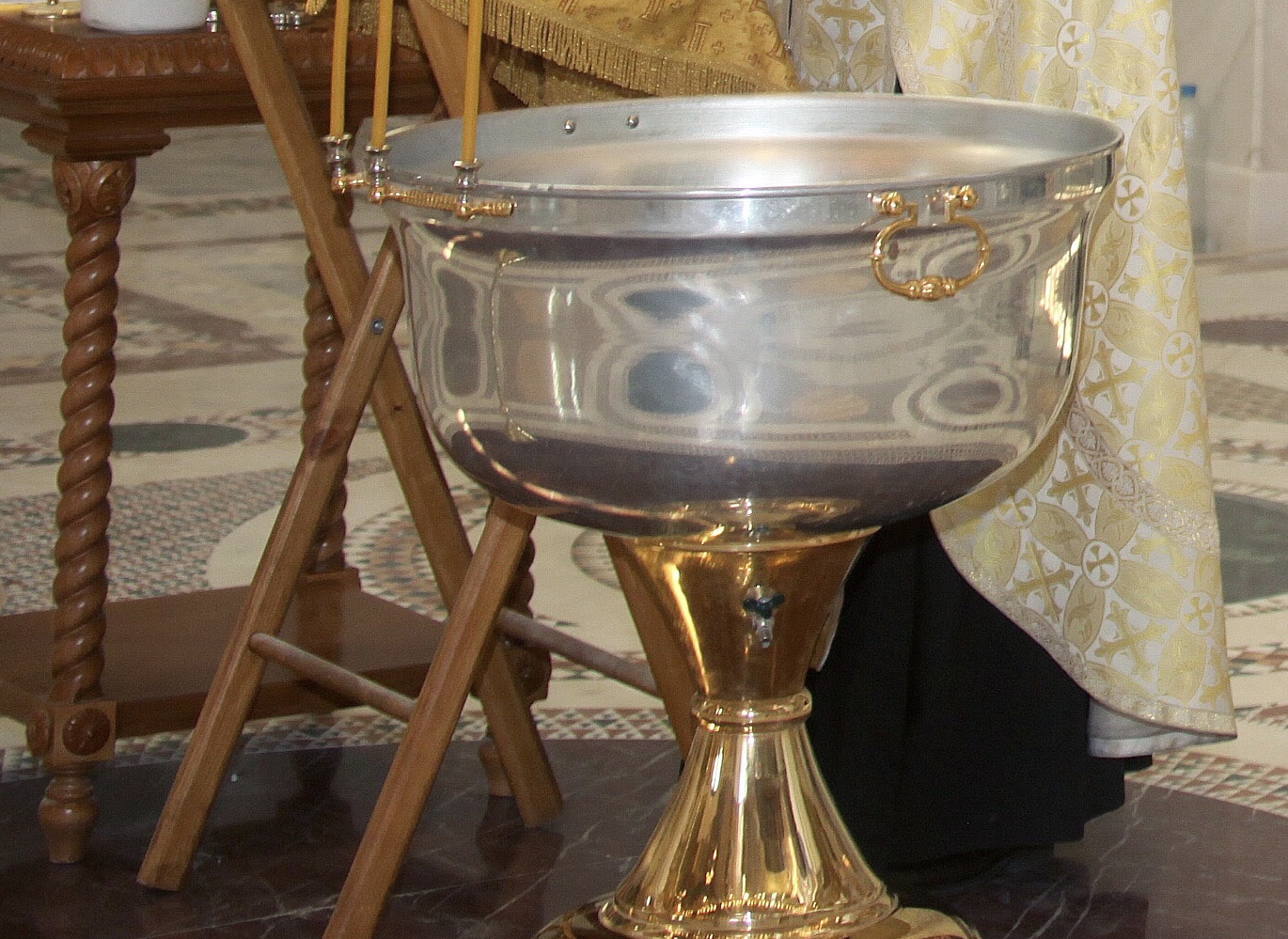Sacraments
Going from one phase of life to another is celebrated in liturgical acts in the Orthodox Church as rites of passage, or more specifically, Sacraments, or Holy Mysteries. These include baptism, chrismation, confession, communion, marriage, ordination, and unction. Other non-sacramental, but yet other rites of passage are the funeral and other devotions. Whether it is entering into married life, or undergoing sickness, taking greater service in the church to as priest and passing from this life to the next are more than societal changes, but are mysteries of the Lord.

Baptism
The Sacrament of Baptism incorporates us into the Church, the Body of Christ, and is our introduction to the life of the Holy Trinity. Water is a natural symbol of cleansing and newness of life. Through the three-fold immersion in the waters of Baptism in the Name of the Holy Trinity, one dies to the old ways of sin and is born to a new life in Christ. Baptism is one’s public identification with Christ Death and victorious Resurrection. Following the custom of the early Church, Orthodoxy encourages the baptism of infants. The Church believes that the Sacrament is bearing witness to the action of God who chooses a child to be an important member of His people. From the day of their baptism, children are expected to mature in the life of the Spirit, through their family and the Church. The Baptism of adults is practiced when there was no previous baptism in the name of the Holy Trinity.

Confession
Confession is the Sacrament through which our sins are forgiven, and our relationship to God and to others is restored and strengthened. Through the Sacrament, Christ our Lord continues to heal those broken in spirit and restore the Father’s love those who are lost. According to Orthodox teaching, the penitent confesses to God and is forgiven by God. The priest is the sacramental witness who represents both Christ and His people. The priest is viewed not as a judge, but as a physician and guide. It is an ancient Orthodox practice for every Christian to have a spiritual father to whom one turns for spiritual advice and counsel. Confession can take place on any number of occasions. The frequency is left the discretion of the individual. In the event of serious sin, however, confession is a necessary preparation for Holy Communion.
Confession is offered following evening services and by appointment with Father Georgy.

Marriage
The family is the basic unit or ‘cell’ of society, and the Christian family is also a major building block of the Orthodox Church. The Church places greet importance on the family to fulfil its role as a small church, as expressed by the Apostle Paul. When St. Paul greeted Priscilla and Aquila, his “fellow workers in Christ Jesus” he also greeted “the church that is in their house” (Romans 16:3, 5). He also greeted “Nymphas and the church that is in his house” (Col 4:15).
The celebration of a marriage in the church is determined by the Church’s liturgical calendar, the parish calendar and other factors. It is necessary to contact the parish priest before the prospective bride and groom choose their date for marriage.

Funeral service for the dead
Death is something that awaits all of us and yet we often wish to avoid thinking about it. As Christians, we understand earthly death as a gateway to life eternal. Preparing ourselves spiritually and making practical arrangements in advance for our funeral is very important. Here is some practical information about Orthodox rites and funeral planning.
Why Funeral Planning is Important:
- It helps give meaning to a person’s life;
- It enables family and friends to come together to express feelings of love, grief and sadness;
- It helps family and friends accept the reality of death, so that they can overcome the emotional pain.
Funeral planning helps ease the pain. By planning now, you can relieve stress and take away some burden on family and friends later.

Home Blessing
Begin Everything with Prayer
Since we are reminded in Scripture to begin whatever we do with prayer, it has been the practice of Orthodox Christians for centuries to have new dwellings blessed either before or just after settling in. This has been extended to one’s business or office, and even college dorm rooms. “The service performed by the priest to bless the new dwelling is somewhat similar to the consecration of a church [in the Russian practice] in that holy water, holy oil, and incense are used and a lesson from the holy Gospel is read. All the rooms of the house are sprinkled with holy water and each of the four outer walls are anointed with the sign of the Cross with holy oil, a candle placed before them, and after the censing of the house, the lesson from the Holy Gospel is read [in Greek practice the service of the Small Blessing of Waters is generally done]. At the conclusion of the blessing, the inhabitants are blessed with holy water: the husband first, followed by the wife and then the children – the oldest first. Relatives and friends present are then blessed.” (Marriage and the Christian Home, by Rev. Michael B. Henning, p.24.)

Request a Prayer
If you cannot come to the temple, but want to pray for your loved ones – send a note from our website.
We will print it out and pray for you at the nearest service.
